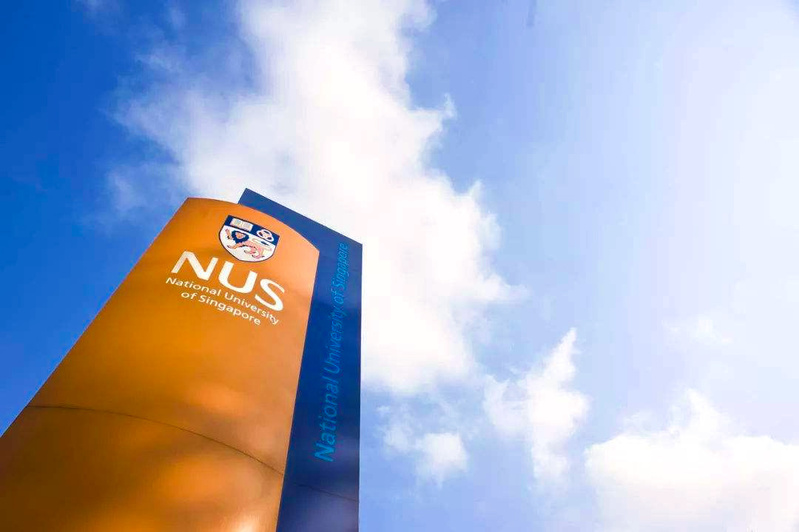
From July 20 to July 31, 29 undergraduates from the College of Chemical and Biological Engineering attended the virtual“NUS Chemical Technology Summer School”, under the leadership of Prof. Wang Wenjun and Mr. Qian Liguang. In the past two weeks, the students listened carefully to professional courses, actively participated in class exhibitions, which put a perfect end to this online overseas exchange.
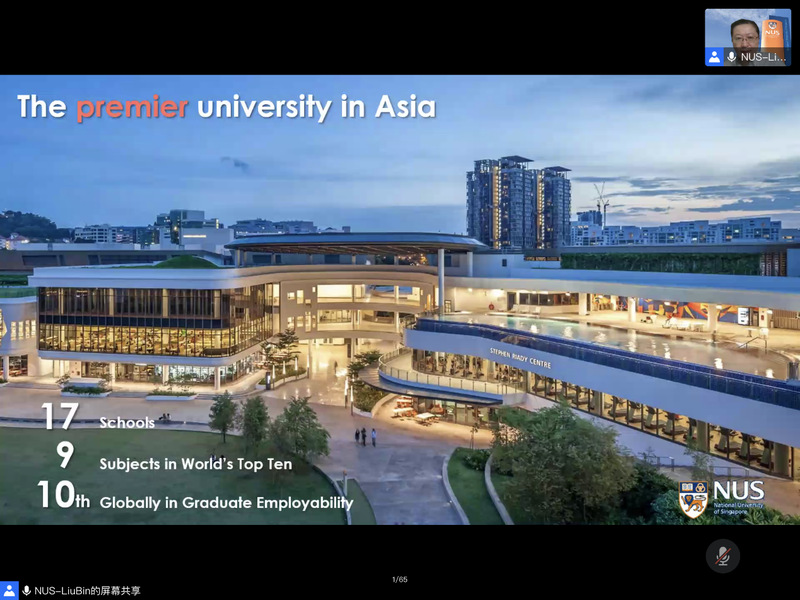
I. General Introduction
National University of Singapore, referred to as NUS (NUS), is one of Singapore's top universities in the world. The school has three campuses, Kent Ridge, Bukit Timah, and Outram Park. It has 17 colleges and 9 majors among the top in the world. In the 2021 QS World University Rankings List released in 2020, NUS ranks first in Asia and 11th in the world.
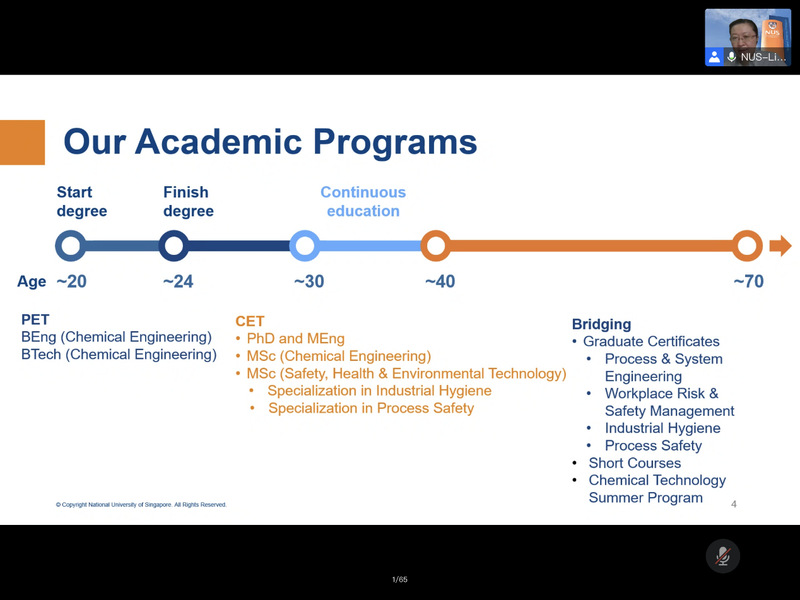
The Department of Chemistry and Biological Engineering of NUS (ChBE), is one of the largest chemistry departments in the world and the oldest chemistry department in Singapore. ChBE has strong practice in both the classical and emerging fields of chemistry and biological engineering; in the 2016 QS World Subject Rankings, ChBE ranked 5th. The department advocates continuous education and has established a series of joint training programs to cultivate students to become leaders in future research, project practice, industry, government and entrepreneurs. At the same time, the department continues to make efforts to promote the research of chemistry and biomolecular engineering, paying attention to the comprehensive and multi-disciplinary approach of education, and forming a unique and effective teaching model, so that prepare students for life-long careers and leadership opportunities.
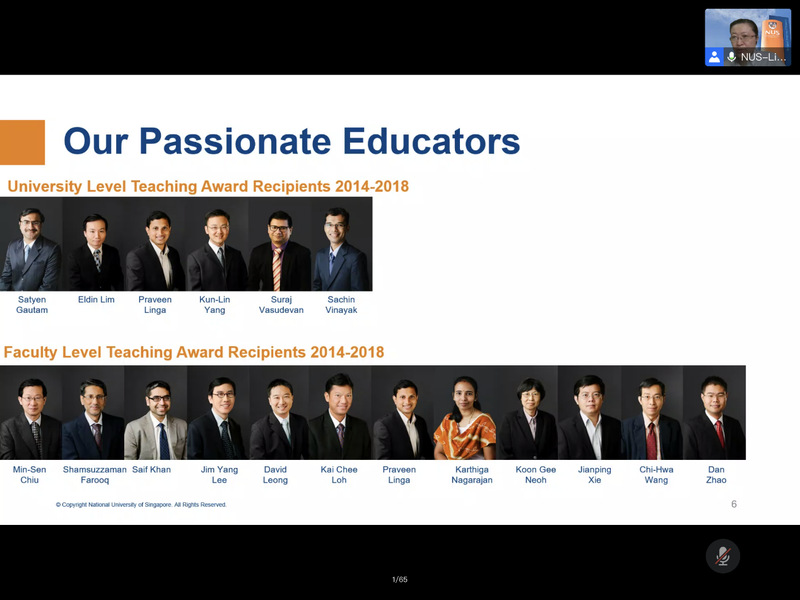
II. Course Content
The course lasted two weeks and was taught by professors from the NUS,ChBE. The course focuses on modern chemical engineering and biomedical technology, mainly including instrumental analysis, nanochemistry and biomedicine, etc.
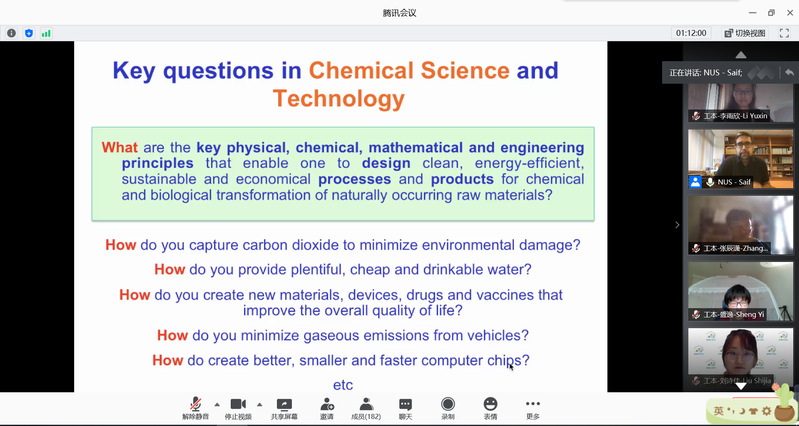
Professor Saif mainly introduced the development of chemical science and technology. He focused on the opportunities and challenges of the current era and the prediction of machine intelligence in the future of chemical science, which gave students a closer understanding of chemical science and technology.
Professor Ivan Sin first had a small interaction with the students on the relevant conditions of the “intention of chemical industry position”, which led to the topic of chemical safety. Professor Sin's in-depth explanation gave students a more comprehensive understanding of what chemical safety is, why we should pay attention to chemical safety, and how to ensure chemical safety.
Professor Satyen Gautam took three classes to introduce to us the knowledge of biopharmaceuticals. Among them, he focused on the relevant biopharmaceutical experiments, and gave very detailed explanations from the principles, operations to precautions. In order to help everyone understand, the teacher will use drawing to assist in the teaching of professional terminology during the lecture. Therefore, students can still get a lot of rewards even when their knowledge of materials is weak.
Professor Li Zhi mainly introduced the knowledge related to enzymes, such as the history and typical reactions of enzyme-catalyzed reactions, the applications and advantages of enzyme-catalyzed in sustainable chemical synthesis, and the evolution methods and specific applications of directed enzymes.
In addition to professional courses, the teachers of the NUS Department of Chemistry also prepared lectures and exhibition skills seminars for the students, which were taught by Associate Professor Loh Kai-Chee. Professor Luo first asked everyone to take turns to give English self-introduction. After listening to each classmate's speech, he first affirmed the students' language skills, and also pointed out the places where the classmates are not good in eye contact, body language, etc. Next, Professor Luo taught the lecture methods for many people. He explained the skills needed to be a good speaker from the three dimensions of “Eye Power”, “Voice Power” and “Body Power”. The course of the exhibition is divided into two parts: Planning Lecture and Delivery Lecture. In the first part, Professor Luo mainly explained the layout skills of the exhibition content and the precautions for PPT production. He emphasized the importance of using information to simplify to attract the audience. At the same time, he suggested that students try to avoid large pieces of content when making PPT. word. In the second part, Professor Luo focused on sharing his experience of how to accurately and effectively convey his own ideas to the audience. After absorbing the goods explained by the professor, the students were divided into 12 sub-groups, and an 8-minute exhibition of self-selected topics included a 6-minute speech and a 2-minute Q&A. After each exhibition, Professor Luo will give a targeted self-evaluation, giving encouragement and pointing out the shortcomings.
The theme of the second group's exhibition is Does technology deprive people of their creativity? They elaborated on the theme from multiple perspectives such as rational derivation, data listing, and case analysis. The performance of the four classmates was highly evaluated by Professor Luo, “Student Wen’s exhibition is very exciting, her voice is very standard, the PPT world is simple, and the text is concise. It seems that she is in full control of the rhythm of the speech. Everything is great. But if the voice is louder, her speech will appear more self-confident.
Online course learning is by no means the same as looking at flowers, and the meticulous learning attitude will not be compromised in the slightest. While carefully listening to the professor's lectures, the students chose to use their own way to make exquisite and practical notes, not only to refine knowledge, but also to record their own experience. Regardless of whether it is paper notes or electronic notes, it reflects the students' cherishment of this exchange opportunity and their enthusiasm for academic exploration.
III. Harvest and Experience
After listening to all the courses, my overall impression of this exchange is: I am familiar with a new perspective. Qian Jiayin said, We have also studied Chemical process, protein structure, common instrument analysis and operated in school. But I can clearly feel the difference between NUS and Zhejiang university in terms of teaching inclination and experimental targets.” Then classmate Qian gave a few examples to explain, “For example, in the content of spectrophotometry, the professor of NUS believes that the upper limit of the general A value is 0.6; in our course, it is generally controlled within the range of 0.2-0.8. When explaining Luang Prairie's law, I can also appreciate that the teaching environment of NUS pays more attention to the understanding of principles, while Zhejiang university focuses more on the application of theorems.
Although this event was online, it was rich in content, Sheng Yi said, The teacher not only teaches the knowledge of professional courses, but also explains the speech skills, which can be said to be very rewarding. Facing the challenges in the learning process, Sheng Yi says that although it is the first time to come into contact with online English presentations, but with the joint efforts of the group members, finally everyone successfully completed the exhibition task and won the appreciation of the designer.
When it comes to understanding whether there are obstacles to the content of the lectures, Liu Shijia said that all the teachers used easy-to-acceptable forms to explain the frontier knowledge of the subject during the course of the lectures so that students could easily understand them. “The lectures given by professors are often combined with many vivid cases, so that we don't get too superficial and learn by thinking. During the two weeks of study, I deeply felt their love for scientific research and teaching, and this love also infected me.”
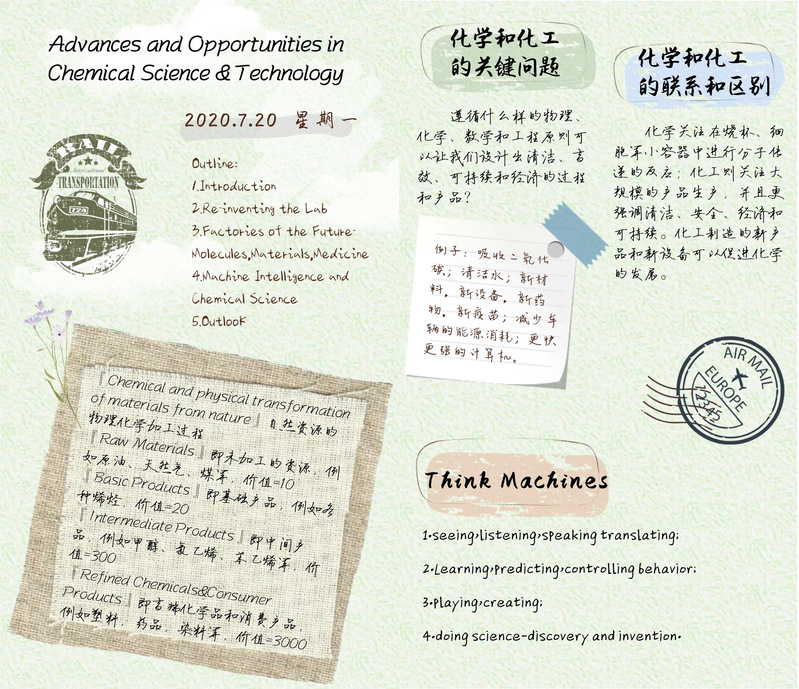
During this online international exchange course, what impressed me most was Professor Saif's lecture on the topic of ‘Advances and Opportunities in Chemical Science & Technology’. Wang Haitao recalled, In this course, Professor Saif introduced some of the more cutting-edge developments in the field of chemical engineering, such as through membrane technology, MOF material, biological cell factory, etc.” Wang also expressed that as a student major in chemical engineering, he believes that what needs to be learned more is not the frontier development direction of the current, but how to discover the development direction of the future. From the course taught by Prof. Saif, I understood that the ultimate goal of chemical engineering is to solve global problems through the development of new technologies, that is, to solve the problems of water, energy, air, and health, which is possible. The technology that can solve these problems is the direction of future development.
IV. Summary
Although the exchange took the form of online, the collision between academic and thinking will not lose its color because of distance. Although we did encounter some episodes in the process, with the joint efforts and cooperation of the teacher and the students, the exchange course ended successfully. The students not only gained professional knowledge, but also experienced the academic atmosphere of NUS. The webcast format has its shortcomings, but under the special circumstances of the epidemic, this format also provides more possibilities for international education. If you can make good use of this approach, academic exchanges may be able to break through the shackles of tradition and move towards a broader future.



